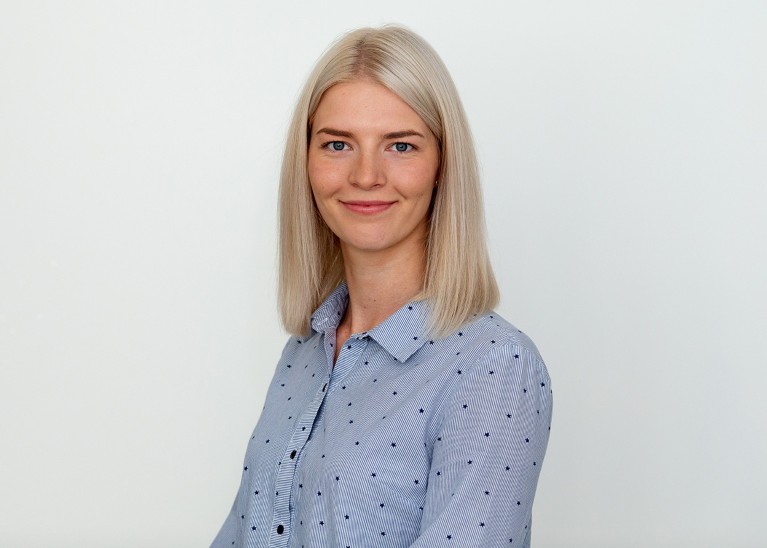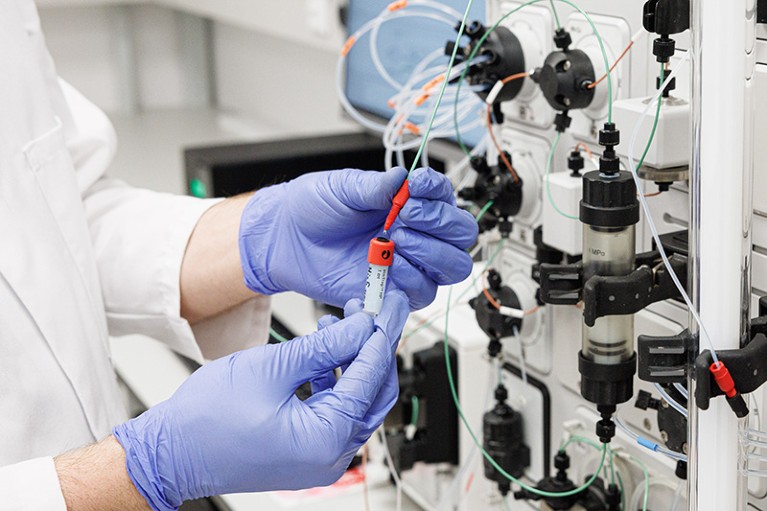[ad_1]

Karolina Makovskytė is head of business development at the firm Caszyme, which specializes in CRISPR-based molecular tools.Credit: Caszyme, LLC archive
Before the COVID-19 pandemic, when I was an undergraduate molecular-biology student at Vilnius University in Lithuania, I loved laboratory work. But when labs closed during the pandemic, I lost my motivation and it never returned.
In 2021, during the fourth and final year of my degree, a recruiter contacted me about a part-time junior product-manager post at the Vilnius site of biotechnology firm Thermo Fisher Scientific. The company was manufacturing reagents for messenger RNA vaccines, and it had built a whole new facility and was producing them on a large scale.
Thermo arrived in the country in 2010, when it acquired Lithuanian biotech company Fermentas for US$260 million. Its Vilnius site manufactures products for the life-science market, specifically molecular, protein and cellular-biology products. It also has a research and development centre.
It’s common for science students to work during their studies and for me it provided a chance to see what working in the biotech field was like, and to find out what options I had with a life-sciences degree, other than working in the laboratory.
I was working on a portfolio of nucleic-acid therapeutics, helping senior product managers with requests from companies for different nucleotides and enzymes, mainly for mRNA vaccine development and production. I carried on working at Thermo, during my master’s degree in molecular biotechnology, also at Vilnius University. Even on the administrative and business side, many people had a master’s or PhD.
As part of my master’s, I attended lectures on the genome-editing tool CRISPR, led by Giedrius Gasiūnas, co-founder and chief scientific officer at biotech company Caszyme in Vilnius.
Virginijus Šikšnys, another co-founder and chair of the management board, is a department head at Vilnius University’s Institute of Biotechnology. This demonstrates the blended nature of academia and the world of biotech start-up companies in Lithuania.
I applied for a business-development manager role there and started work in March 2022, while doing my master’s degree, which I completed last year. My job involves relationship building and representing the company abroad.
The company discovers and develops CRISPR-based molecular tools for diverse applications. It has 17 scientists and is growing all the time. In January, we moved premises to a larger building opposite the Vilnius site of the firm Northway Biotech, and close to Vilnius University Hospital.
Currently, Caszyme focuses on three elements. The first is research: finding new CRISPR–Cas nucleases for companies that are looking for specific characteristics. Second is licences: the company has a platform of nucleases that it has already identified, and it offers licences for further development. And third is analysis: Caszyme helps companies with expression, purification and biochemical analysis of Cas nucleases.
Currently, the firm has a handful of active collaborations in the therapeutics and diagnostics fields, including in infectious diseases and agriculture.
A friendly and close community
I think there are many aspects of academia and industry that set Lithuania apart from other countries. First, we have great universities that prepare scientists very well for the future. Scientists leave with not only theoretical knowledge, but also research experience working in a lab.

Karolina Makovskytė moved into industry after discovering the lab was not for her.Credit: Caszyme, LLC archive
Second is that the ecosystem is not a big one. It’s very easy to get to know most people and that’s an advantage because it makes collaborations easier.
Third, industry scientists have close contact with government institutions that ask us what businesses want and how they can help. I don’t want to say it’s easy to build a biotechnology company, but Lithuania has all the right tools to do high-quality research.
My proudest achievement is probably my personal growth. I can really see a difference between now and when I started working — I’ve gained knowledge and experience, and matured as a person. Last June, aged 25, I was promoted to head of business development.
I work remotely in Kaunas, the second-largest city in Lithuania, which has a beautiful old town and is known for its art deco architecture. We have three international airports and Vilnius is only an hour and a half by road, so it’s easy to get to the office when I need to. Some of my time is spent abroad — I’ve just come back from a technology summit in San Francisco, California, and now I’m in Rome.
I don’t want to work abroad permanently. Lithuania has wonderful countryside and is full of culture, too. Every year, in March we have an international film festival, which I have worked for as a volunteer in the past.
If you find you don’t like working in a lab, like me, my advice would be to find a job outside the lab and see if it fits. If it doesn’t, try something else and talk to people who have different positions in life sciences. Explore the opportunities.
I talk to lots of people at events and many of them have PhDs or have worked as postdocs but have decided that they don’t want to be scientists. There’s nothing shameful in that. People who work in business development or operations and who have a scientific degree are essential, too.
My advice for young scientists who are considering a research position in Lithuania is to just do it. We have a friendly and close research community so it’s very easy to collaborate. Also, scientists here have a wide network all over the world. It’s very easy to join projects that Lithuanian scientists are doing with global institutes and companies. We Lithuanians talk to each other a lot!
Jacqui Thornton’s travel and accommodation were provided by Go Vilnius, a development agency.
This interview has been edited for length and clarity.
This article is part of Nature Spotlight: Lithuania, an editorially independent supplement. Advertisers have no influence over the content.
[ad_2]
Source Article Link

